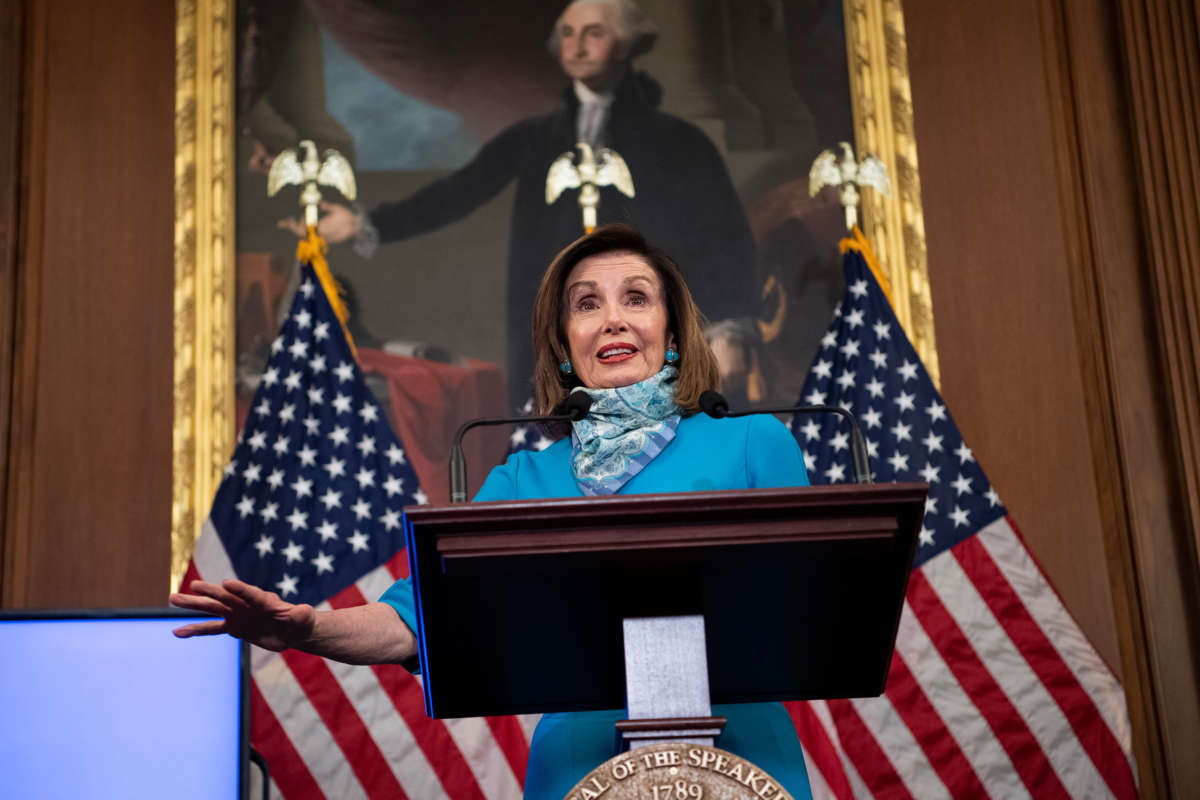Honest, paywall-free news is rare. Please support our boldly independent journalism with a donation of any size.
House Democrats’ newest coronavirus relief proposal would allow influential Washington lobbying groups — funded by deep-pocketed corporations — to access forgivable small business loans.
House Speaker Nancy Pelosi (D-Calif.) unveiled Democrats’ $3 trillion relief package Tuesday. The bill would provide nearly $1 trillion in relief to states, cities and tribal governments and authorize a second round of direct payments to American families. But buried in the 1,815-page bill is a provision that allows trade associations, unions and 501(c)(4)s, not just charities, to access coveted small business loans.
The bill sets aside a portion of small business loans specifically for nonprofits with 500 or fewer employees. The Democratic Policy Center, a progressive group that opposes government assistance to lobbying groups, found that over 99 percent of trade associations and chambers of commerce have fewer than 500 employees. Some of the top lobbying spenders this cycle, including the U.S. Chamber of Commerce, National Association of Realtors and Pharmaceutical Research and Manufacturers of America, could qualify for that pool of money, according to their most recent tax filings.
Most of these lobbying giants aren’t short on cash. The pharmaceutical industry’s top trade group brought in $459 million in 2018 and had over $43 million in the bank, according to tax filings.
“The fact that there’s no revenue cap here, that it can go to organizations that receive hundreds of millions of dollars every year and that exist as lobbying operations first and foremost, is just crazy,” said Andrew Perez, co-founder of the Democratic Policy Center.
Trade associations are primarily tasked with lobbying Congress and the federal government on behalf of their members. Their influence operations include dispatching revolving door lobbyists with close ties to key officials, launching expensive public relations campaigns, flying their members to the Capitol and making PAC contributions to lawmakers’ reelection campaigns. A majority of the most powerful trade groups are led by former government officials who earn seven-figure salaries to leverage their connections.
Trade groups have sizable sway over legislative battles. Congressional Republicans are currently pushing to shield businesses from lawsuits related to the coronavirus outbreak. That measure is supported by the U.S. Chamber of Commerce, the big business lobbying group that spends millions backing Republican reelection campaigns with “dark money” each cycle.
Prominent Democrats, whose campaigns and party committees are bankrolled by trial lawyers’ trade group the American Association for Justice, have attacked the Republican proposal. Senate Majority Leader Mitch McConnell (R-Ky.) said Congress must act to prevent the “biggest trial lawyer bonanza in history” while Senate Minority Leader Chuck Schumer (D-N.Y.) accused McConnell of “fighting to protect corporate executives.”
Senate Republicans told reporters that House Democrats’ $3 trillion proposal is “dead on arrival” in the upper chamber. Democrats’ small business provision is a spin-off of a bipartisan measure introduced last week that would allow 501(c)(6)s with fewer than 300 employees to access small business assistance. Those lawmakers said the bill was meant to help local and state-level chambers of commerce. Major trade groups endorsed the legislation.
Trade associations’ PACs provide a large chunk of campaign cash to incumbent lawmakers. The National Beer Wholesalers Association PAC has already given $1.8 million to candidates this cycle, funneling campaign cash to over 400 members of Congress. The American Bankers Association and Credit Union National Association PACs each gave around $1.6 million.
Corporations and trade associations cannot donate directly to candidates. But they can spend unlimited corporate funds on lavish fundraisers or create incentives for their employees to contribute to the PAC. About three-fourths of PAC giving comes from business interests, giving private industry an advantage over unions and issue organizations.
Businesses and their trade groups dominate lobbying too, accounting for 89 percent of lobbying spending through the first quarter of 2020. The $2.2 trillion stimulus package passed in March is already the second most-lobbied bill on record. Even as corporations were hurting for cash, clients managed to shell out near-record amounts of money on lobbying to start 2020. Main Street businesses, meanwhile, are struggling to stay afloat as many have yet to receive small business loans.
Disclosure: The Center for Responsive Politics has received a loan from the Small Business Administration authorized by the CARES Act. Additionally, Andrew Perez previously co-published stories with OpenSecrets.org during his time with MapLight, an organization that tracks money in politics.
Trump is silencing political dissent. We appeal for your support.
Progressive nonprofits are the latest target caught in Trump’s crosshairs. With the aim of eliminating political opposition, Trump and his sycophants are working to curb government funding, constrain private foundations, and even cut tax-exempt status from organizations he dislikes.
We’re concerned, because Truthout is not immune to such bad-faith attacks.
We can only resist Trump’s attacks by cultivating a strong base of support. The right-wing mediasphere is funded comfortably by billionaire owners and venture capitalist philanthropists. At Truthout, we have you.
Our fundraising campaign is over, but we fell a bit short and still need your help. Please take a meaningful action in the fight against authoritarianism: make a one-time or monthly donation to Truthout. If you have the means, please dig deep.
